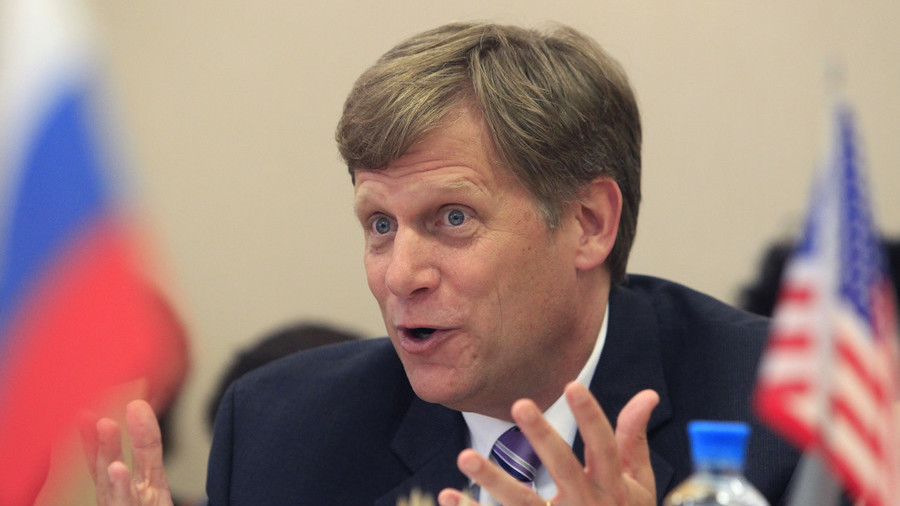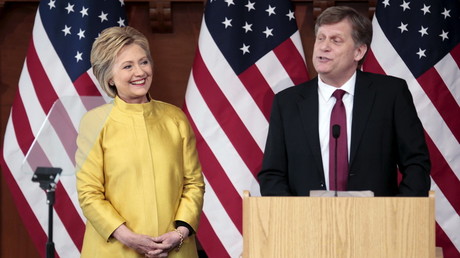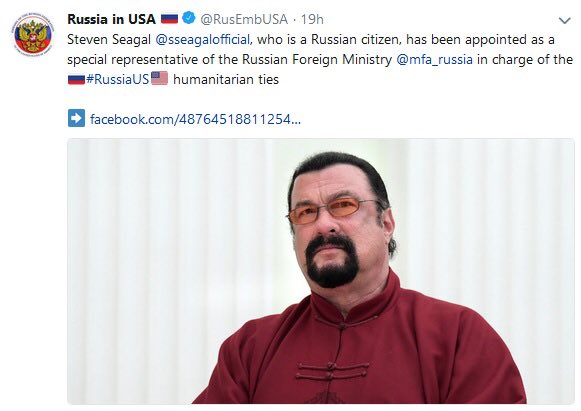Michael McFaul, what have YOU done to help improve US-Russia relations?
Robert Bridge is an American writer and journalist. Former Editor-in-Chief of The Moscow News, he is author of the book, 'Midnight in the American Empire,' released in 2013.

The former US ambassador to Russia has proven to be quite adept at chastising Russia at every turn, even in retirement, but what exactly has McFaul done to create an atmosphere of lasting peace between the Moscow and Washington?
It was the summer of 2013 when I had my first and only encounter with Michael McFaul, then-US Ambassador to Russia. It was a Saturday afternoon, and a black sedan pulled into the parking lot of the prestigious Anglo-American School, a private learning facility located in the outskirts of Moscow where many foreign diplomats and corporate executives enroll their children.
A burly driver opened the door and into the scorching sun appeared his excellency Michael McFaul. After exchanging brief pleasantries, the ambassador strolled to the bleachers on the opposite side of the field to await the beginning of a children’s baseball game; a bit of an anticlimactic spectacle to the grand entry. I remember thinking to myself at the time, as he took a seat by himself across the pitch, ‘There goes the loneliest man in the world.’
Sooner than I would have imagined, my impression of the ambassador and his unenviable situation in Russia was validated. Several months later, McFaul abruptly resigned from his post after just two years on the job, returning to the dusty halls of academia from where he had first emerged to work in the Obama administration. Despite his retirement, and being banned from Russia, McFaul elicits inflammatory opinions on ‘Putin’s Russia’ on a regular basis. Few of his verbal fusillades prove helpful at injecting some semblance of sanity back into the US-Russia relationship.
This week, for example, McFaul went head-to-head against Steven Seagal, the Hollywood actor and martial arts expert who was just appointed as Russia’s ‘special representative on humanitarian relations with the US.’ Seagal’s work includes, among other duties, “promoting bilateral ties in a wide range of fields including culture, art, science, education, sports, public and youth exchanges.”
Considering the basement-level status of the US-Russia relationship, it would seem that any attempt to forge bonds between the two nuclear powers deserves applause, even if it’s just a polite golf clap. Apparently not if your Michael McFaul. Following the appointment, McFaul promptly fired up his Twitter account to pedantically slam Seagal for using British spelling as opposed to American while announcing his new post. Our esteemed academic, however, broke the first rule of social-media sparring by failing to ensure that his own tweet was grammatically sound.
In any event, McFaul went on to predict that Seagal would fail to “achieve any success in improving Russian-American relations,” not only because the Hollywood actor has “almost no influence” in the United States, but because - wait for it – “he has no experience in diplomacy.”
As the attentive reader will recall, the lack of diplomatic credentials was precisely one of the main arguments against McFaul’s two-year stint as US ambassador. Not only was the Stanford professor the first non-career diplomat to serve as US ambassador to Russia, he arrived in Moscow with a rather odd CV, which included a doctorate dissertation devoted to the “theory of revolution in an international context.” To complicate his stay in Russia even more, one of McFaul’s very first orders of business in Moscow was to meet with members of the Russian opposition – and at the very same time street protests and color revolutions were becoming all the rage.
The story gets better. Judging by a recent request put forward by Russia’s general prosecutor’s office, in which it specifically named Michael McFaul as a person of interest in the criminal case against Bill Browder, the British financier who is wanted in Russia for illegally removing $1.5 billion out of the country, it would suggest that the ambassador was not limited to just meeting with political agitators. McFaul, however, has denied any wrongdoing.
This was just the later innings, as it were, of what appears to have been a doubleheader the professor was playing. Before being nominated to the position of US ambassador, Michael McFaul was a senior adviser of the Obama administration, where he went on to become the architect of the much-maligned US-Russia ‘Reset.’ You know a program is doomed from the start when not even the US State Department is able to correctly translate the idea into Russian. For a man who is so concerned with proper spelling, you’d think he would have gotten that one right.
Yet it was much more than just poor translating skills that ensured the demise of the ‘Reset;’ the failure was a result of Washington’s absolute refusal to cooperate with Russia on the US missile defense shield in Eastern Europe. Any serious discussion on the US-Russia bilateral relationship is incomplete without mentioning this part of the story.
Initially pledging to “shelve” the brainchild weapon system of the Bush administration (just months after McFaul’s ‘Reset’ is announced in March 2009), the Obama administration shifted gears, telling the world it would opt for a scaled-down version of the system, all the while holding out the carrot of cooperation to Moscow. However, unless the Obama administration committed itself to a real partnership with Russia, McFaul’s ‘Reset’ would have to be interpreted for what it arguably was: an elaborate smokescreen to soften up Moscow into believing the White House had honorable intentions. As events strongly indicate, it did not.
That much was underscored by Vladimir Putin’s recent state of the nation address in which he revealed the introduction of weapon systems that make “obsolete” any missile defense shield in the world. Had the Obama administration not taken a cynical and deceptive approach to its ‘diplomatic’ relations with Russia, as demonstrated by McFaul’s fake ‘Reset,’ the world would not be perched on the precipice of disaster as it is today.
These days, the former US ambassador continues to muddy the bilateral waters, dispatching tirades against Russia via Twitter to his 339 thousand followers, many of whom share the same jaded views, which has a tendency to occur whenever ideas are cultivated in an echo chamber.
It may go down as the tragedy of our days that the Obama administration, believing Russia was down for the proverbial count, dispatched to Moscow a non-diplomat at the precise moment when diplomacy between the two nuclear powers was more important than ever. In hindsight, it was a cynical, dangerous move on the global chessboard that will have ramifications on international politics for many decades to come. Russia not only survived the challenge, but looks quite capable of defending its long-term interests.
I am forced to conclude that Michael McFaul and his colleagues in the Obama administration must view Russia’s stunning revival, as witnessed on the military and economic fronts, as a genuine ‘failure of diplomacy’ on their part. With that sort of diplomacy, who needs enemies?
Think your friends would be interested? Share this story!
The statements, views and opinions expressed in this column are solely those of the author and do not necessarily represent those of RT.



0 Comments:
Post a Comment
Subscribe to Post Comments [Atom]
<< Home